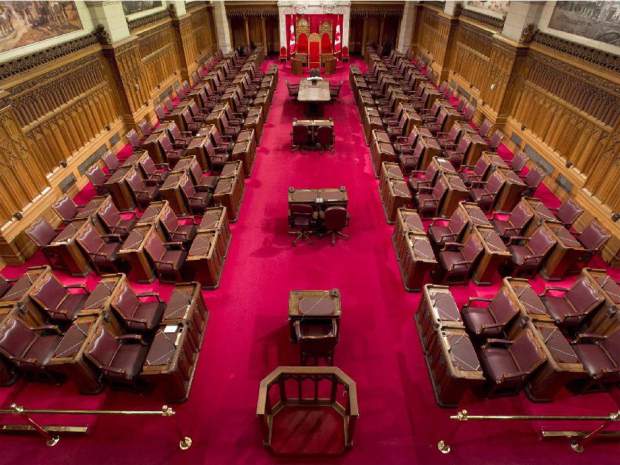In the face of bills meandering their way through the Upper Chamber, the Leader of the Government in the Senate err, "government representative," Senator Peter Harder, has put forward a series of proposals to ensure that bills get their sober second thought in a more streamlined and efficient manner. If this sounds familiar, it's because much of it eerily follows some of the proposals put forward by Government House Leader Bardish Chagger in her own discussion paper on how to "modernize" the House of Commons' own Standing Orders for the sake of predictability and efficiency.
As with Chagger's proposals demonstrating her dubious competence as House Leader to negotiate with other parties to get bills through in a reasonable amount of time (which is coupled with our increasingly debased parliamentary debating culture), this proposal by Harder looks an awful lot to those inside the institution as an admission of failure that he's unable to do his own job of shepherding the government's agenda, so now he wants to change the rules. In recent days, Harder has gone out of his way to insult senators who were appointed under previous processes, and in his paper, launches a broadside at the Conservatives forming the chamber's Official Opposition, accusing them of delaying for the sake of delay, and of undermining the credibility of their arguments through use of tactics.
Part of the problem, however, is that Harder hasn't been doing his job. I've spoken to a number of people in the Senate who say that on these very bills that he's now expressing grave concern that they've taken so long bills like C-6 on citizenship revocations, and Bill C-16 on trans rights Harder hasn't been trying to use his moral suasion as "government representative" to try and get the other caucuses to try and move them along. As well, he has yet to use the actual powers given to him as Government Leader (though he may style himself something else) to invoke time allocation on bills that he sees as critical to get passed in shorter periods of time. You would think that if they were that important, that he would be able to convince enough of the independents senators or the Senate Liberals to support such a motion go get these bills through, but he hasn't.
Another reason why Harder seems not to be doing his job is that opposition majorities are not a new phenomenon in the Senate. In fact, they are a regular occurrence after a change in government, and yet, we have a history of Government Leaders who have been able to get legislation through the chamber despite an angry and more numerous caucus on the opposite side, with plenty of hard work and negotiation. They managed to make it work using the existing rules of the Senate, and yet Harder has not and as we've seen, indications seem to be that he hasn't even tried. For him to ask for the rules to change at this point seems premature at best, and suspect at worst.
In his paper, released on Friday, Harder cites several models that the Senate could consider rather than the status quo things like programming motions (as they do in the UK, while Chagger's proposal for the same has MPs are up in arms), uniform time limits after which bills are considered to be "deemed adopted" whether they were voted on or not (much as the Estimates are now in the House of Commons), setting completion dates for bills into the Rules of the Senate (as the Saskatchewan legislature employs), or his preferred model, the creation of a Senate Business Committee to schedule and manage the debates. There was a programming motion used around the debate on Bill C-14, with medically-assisted dying, but that was also in recognition of the fact that there was a Supreme Court of Canada-imposed deadline on the process, which senators were cognisant of. Most other bills that aren't of a fiscal nature don't face those kinds of time constraints.
Part of the problem with his Business Committee proposal is that it seems to misunderstand that the Senate is a deliberative body, and sometimes, deliberation takes time (which the proponents of the amendments to C-6 have certainly found). One of the reasons that we don't often see a lot of successive debate on bills is that the next speaker generally wants to take time to craft a response to the speech that was just delivered before responding to it, which is valid. As well, the current Rules of the Senate greatly empower individual senators and ensures that they have the right to speak to any issue it's one of the reasons why the entire Order Paper is read out on every sitting day, though generally caucuses will negotiate as to what business they plan to cover that day at the "scroll meeting" every morning. Harder's Business Committee proposal would be a step to curtailing those individual powers, which seems a bit antithetical to his other usual stance in that he's looking to blow up the Westminster model in the Senate and trying to do away with caucuses in general. It's also very problematic that his specific proposals that different committee decisions would require different thresholds to pass goes against the constitutional requirements that the Senate be able to operate by majority vote.
The fact that Harder is trying to push this issue of trying to better manage the Senate on his own terms is indicative that he's trying to grab power without having the votes to do so in the chamber, and that's a problem. As well, there should be no presumption that all bills must pass, because it's the Senate's constitutional role to stop bills that they deem a problem, nor should sober second thought be relegated to a timed exercise. The Senate has institutional independence, and Harder seems to have forgotten that fact in his bid to turn the chamber into a bureaucratic advisory body.






